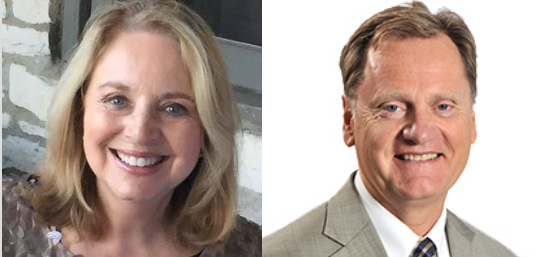Connie Schmett hired Doug Gross to represent her in an ethics investigation within a day of the senior BrownWinick partner arguing a position before the state board on which Schmett serves.
Bleeding Heartland previously reported that Rebecca Brommel of the BrownWinick law firm represented Connie Schmett and her husband Kim Schmett during the Iowa Ethics and Campaign Disclosure Board’s probe of possible violations related to lobbying for a foreign government, personal financial disclosure forms, and political contributions. The firm has a large Health Law Practice group and regularly brings business before the Health Facilities Council, which decides whether to approve health care providers’ Certificate of Need applications. Connie Schmett has served on that board since 2013.
Documents released in response to an open records request indicate that Gross himself was on the Schmetts’ legal team. In this November 8 e-mail, ethics board executive director Megan Tooker informed Connie Schmett that a meeting to revise personal financial disclosures would have to wait until Tooker got a green light from Gross and Brommel.
Probably no attorney has brought more matters before the Health Facilities Council during Schmett’s tenure than Gross. By my count, he has taken part in nineteen board meetings since mid-2013 on behalf of more than two dozen clients. (Links to the minutes and summaries of BrownWinick participation can be found at the end of this post.)
In fact, on the morning of November 7, Gross argued against granting a certificate of need for an ambulatory surgery center in Cedar Rapids. While many Health Facilities Council decisions are unanimous, that one was controversial, passing by 3 votes to 2. Schmett cast one of the votes against allowing the center to be built.
That afternoon, Governor Kim Reynolds told reporters her staff had asked the Iowa Ethics and Campaign Disclosure Board to determine whether the Schmetts had violated any state laws while registered as foreign agents for Saudi Arabia.
By the following day, Gross was representing the Schmetts. Tooker explained in an e-mail last month,
Kim and Connie Schmett came to my office on November 8th in order to amend Connie’s personal financial disclosure statements. While speaking to them, I learned they were represented by Doug Gross. I informed them I needed to talk to Doug before helping Connie amend her PFDs. I called and talked to Doug and Becki Brommel who confirmed they were representing the Schmetts. After that initial phone call, all of my communication was with Becki. I visited the BrownWinick law firm and reviewed documents related to the Schmetts, including their tax returns. I met only with Becki and did not see or talk to Doug while I was there.
Records of communication between the ethics board and BrownWinick staff (enclosed below) do not reveal any further contact between Tooker and Gross.
Iowa law defining conflicts of interest for state officials does not mention hiring lawyers who bring matters before the relevant state government body. However, several attorneys told me that doing legal work for a regulator who decided cases involving the firm’s other clients would create the appearance of a conflict of interest. Brommel commented in January,
The BrownWinick Law Firm did not represent Kim or Connie Schmett during the time in which the firm had matters for other clients before Ms. Schmett and her fellow Council Members on the State Health Facilities Council. The representation of Kim and Connie Schmett with regard to the Ethics and Campaign Disclosure Board matter did not begin until after the November 2017 meeting of the State Health Facilities Council. Before agreeing to represent Kim and Connie Schmett, BrownWinick advised Ms. Schmett that she would be obligated to recuse herself from any matters brought before the State Health Facilities Council during the time BrownWinick was representing Kim and Connie Schmett if such matter involved applicants or affected parties represented by BrownWinick.
According to Iowa Department of Public Health staff, BrownWinick did not represent any clients at the two Health Facilities Council meetings since November 2017.
Nevertheless, state lawmakers should consider amending Iowa Code 68B.2A to limit or prohibit officials from hiring attorneys they encounter while doing the public’s business. Meanwhile, members of state boards or commissions would do well to seek legal counsel elsewhere.
P.S.- The records confirm (pp. 1-3) that Schmett paid the $250 fine Iowa Ethics and Campaign Disclosure Board members approved in January for omissions on personal financial disclosures. Ironically, she wrote a check from the “Connie Russell” account used for most of her political donations over the years.
The newly-disclosed documents also explain why the Reynolds campaign had no record of a $150 donation Connie Schmett reported in a Foreign Agents Registration Act filing last November. That check was written but “never cashed.” (see pp. 4 and 5)
Documents provided by the Iowa Ethics and Campaign Disclosure Board in response to a request for records of communications between board staff, board members, and employees of the BrownWinick law firm:
Top image: Connie Schmett and Doug Gross.


1 Comment
The respondent decides when the ethics board's interest in a matter is closed?
The second paragraph of Becki Brommel’s Feb. 16th letter to her dear friend Megan Tooker at the Iowa Ethics and Campaign Disclosure Board says it all with regard to the usefulness of this agency and the competence of its director. Gee Becki, why not just send notice to dear Megan that, after further consideration, you decided the board’s proposed fine didn’t strike you as fair since the check was never cashed, and you’d just as soon close the matter without any action whatsoever.
Further, why the solicitous agreement with Doug Gross’ request that dear Megan not meet with the respondent after Bishop/Russell/Schmett had requested such a meeting, but before respondent had hired the Brown law firm? Why not instead advise Mr. Gross to show up at the appointed time and place and actually do some work?
JohnMorrissey Mon 12 Mar 3:31 PM